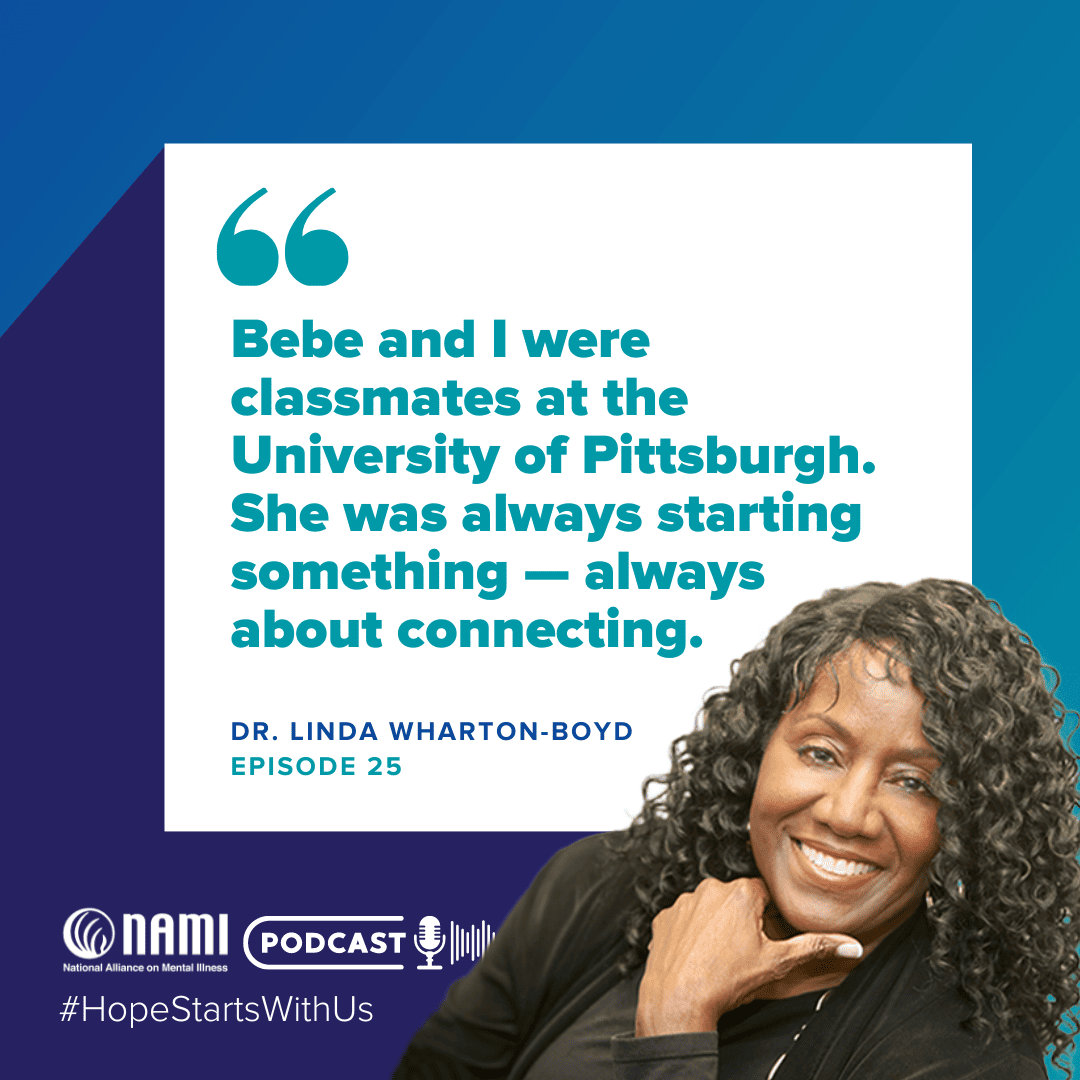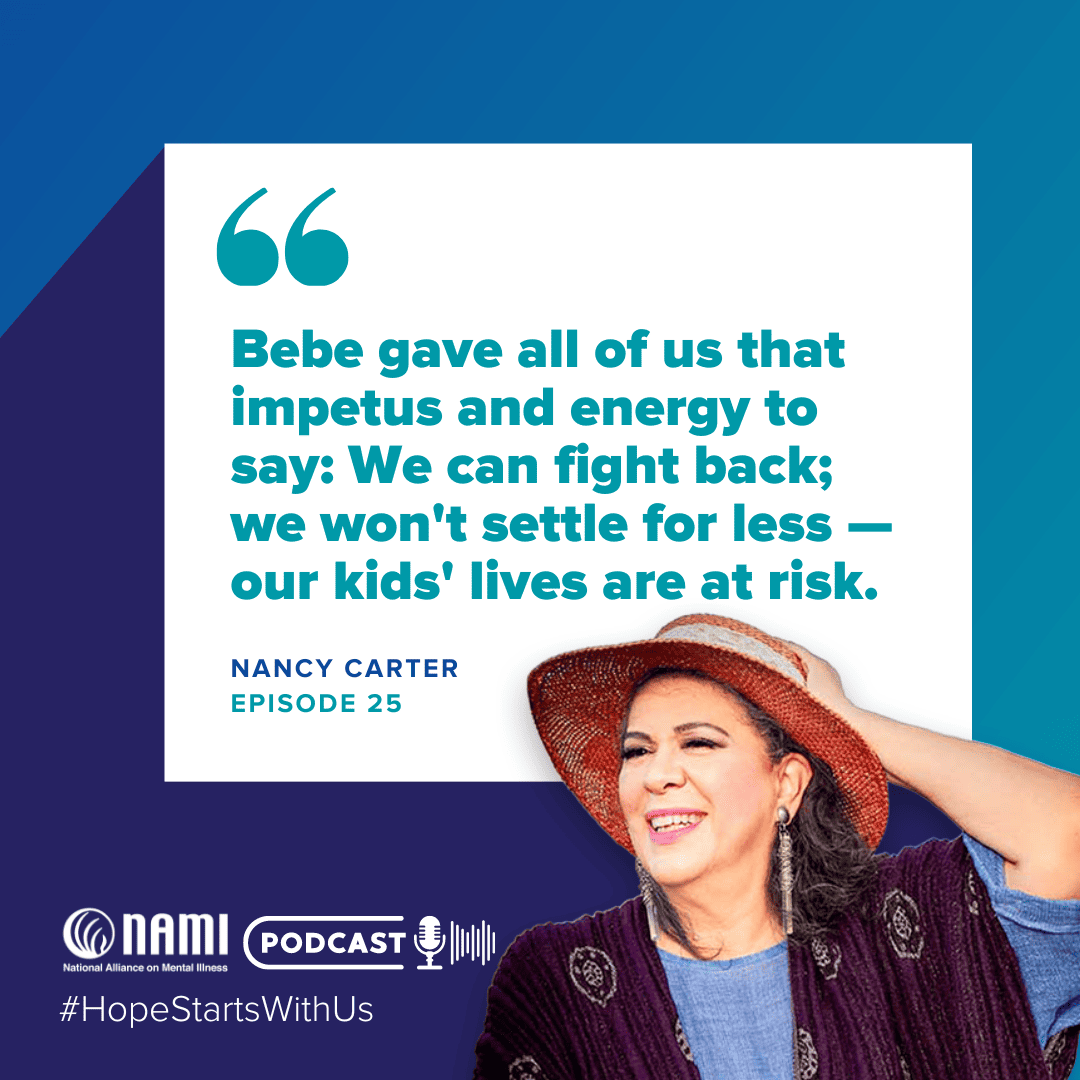July 12, 2023
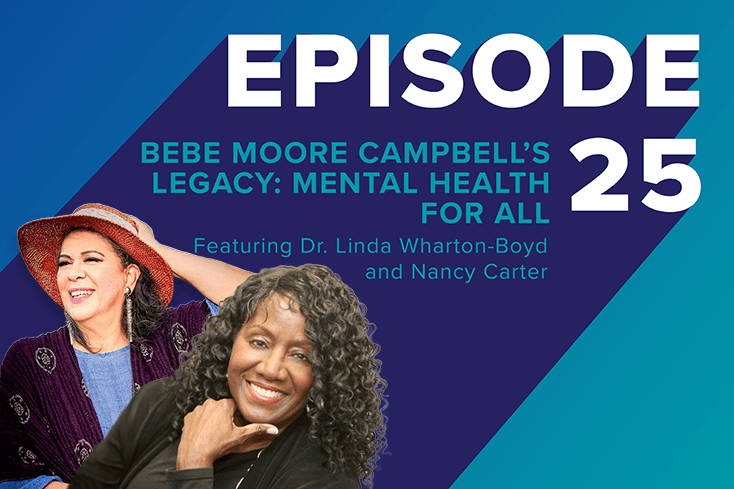
In this episode of NAMI’s podcast, NAMI CEO Daniel H. Gillison Jr. speaks with friends of Bebe Moore Campbell, Dr. Linda Wharton-Boyd and Nancy Carter about Bebe’s impact and how we can all play a role in keeping her legacy alive.
You can find additional episodes of this NAMI podcast and others at nami.org/podcast.
We hope this podcast encourages you, inspires you, helps you and brings you further into the collective to know: you are not alone.
Episodes will air every other Wednesday and will be available on most major directories and apps.
Episode Audio:
Episode Video:
Featured Guest:
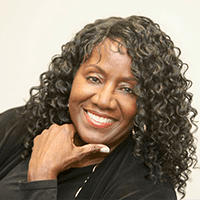
Dr. Linda Wharton-Boyd
Dr. Linda Wharton-Boyd was a longtime friend of Bebe Moore Campbell who conceptualized the idea of a national minority mental health month. After Bebe’s passing, she worked with others to pass legislation that officially designated July as Bebe Moore Campbell National Minority Mental Health Month in Bebe’s honor. Dr. Wharton-Boyd continues to keep Bebe’s legacy alive through her work with the Bebe Moore Campbell Minority Mental Health task force and the “Erase the Stigma, Not Her Name” campaign.
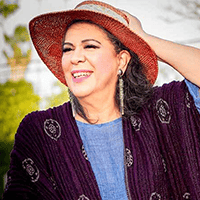
Nancy Carter
Nancy Carter co-founded NAMI Urban LA (formerly NAMI Inglewood) with Bebe Moore Campbell and served as a past board member of NAMI National. She is a fierce advocate, passionate peer and loving family member. As one of Bebe Moore’s late friends, she is passionate about keeping Bebe’s legacy of mental health for all alive today and always
Share on Social Media:
Episode Transcript:
[0:00]
[background music]
Linda
Wharton‑Boyd: [0:01] One of the things that Bebe was very clear on,
and that was that if we could erase the stigma of mental illness in our
communities, our people would be more ready to get help. We’re going to leave
this black woman’s name alive and moving, because this movement that she
started is for real.
Nancy
Carter: [0:17] Bebe came into my life in 1999 for a reason, she stayed for
a season, and she’s been in my heart for a lifetime. She gave all of us that
energy and that impetus to say we can fight back.
Dan
Gillison: [0:31] Welcome to Hope Starts With Us, a podcast by NAMI, the
National Alliance on Mental Illness. I’m your host, Daniel H. Gillison Jr, NAMI
CEO. We started this podcast because we believe that hope starts with us.
[0:46]
Hope starts with us talking about mental health. Hope starts with us making
information accessible. Hope starts with us providing resources and practical
advice. Hope starts with us sharing our stories. Hope starts with us breaking
the stigma.
[1:02]
If you or a loved one is struggling with a mental health condition and have
been looking for hope, we made this podcast for you. Hope starts with all of
us. Hope is a collective. We hope that each episode with each conversation
brings you into that collective to know you are not alone.
[1:20]
Today, I’m joined by longtime friends of Bebe Moore Campbell, Nancy Carter, and
Dr. Linda Wharton Boyd, in honor of BB Moore Campbell National Minority Mental
Health Awareness Month.
[1:32]
We are so thrilled to be able to share about Bebe’s legacy and how we are all
continuing to carry the work she started forward today. Personally, I met Bebe
way before I ever thought I would ever be CEO at NAMI or even working in the
mental health space. I had no idea that she was an acclaimed writer, a national
speaker, and the mom of a Hollywood actor.
[1:54]
I didn’t know about her involvement with NAMI, or about all the struggles she
faced trying to find resources for her daughter living with bipolar disorder. I
just knew she was a college friend of one of my friends and former colleagues
at Xerox.
[2:08]
One night when Bebe was in DC working with Congress, my friend hosted a dinner
and I was fortunate enough to meet her. She created a lasting impact on me over
15 years later, and I’m proud to be working in this space, hoping that I’m
truly continuing the work she started.
[2:23]
There’s so much that can be said about Bebe. Can you all share more about Bebe?
Who Bebe was to you and how you met her, and some things people may not know
about her? Nancy? Linda?
Nancy:
[2:37] I’d like to throw it to Linda and just make a slight correction, Dan. I
wish that I had been Bebe’s longtime friend. We had a very short relationship.
There’s an old saying that people come into your life for a reason, a season,
or a lifetime.
[2:54]
Bebe came into my life in 1999 for a reason that we all know, she stayed for a
season, and she’s been in my heart for a lifetime. We actually only knew each
other from ’99 until she passed. Linda was her longtime friend forever and
ever. Linda, I think you should take this ball and roll with it first.
Linda:
[3:16] Sure. I’d love to. Listen, Bebe and I were classmates at the University
of Pittsburgh.
Nancy:
[3:22] I know.
Linda:
[3:22] She came from Philadelphia and I came from Baltimore. Our intersection
was at the university. You had two urban girls coming together at the
University of Pittsburgh. We worked together. We joined the Black Action
Society.
[3:38]
Bebe started an organization ‑‑ I always like to tell people ‑‑
called Black Women for Black Men. She always about connecting. She was always ‑‑
even on during the campus ‑‑ she was always connecting us. She came
with a serious mind to write and to improve her writing.
[4:01]
She studied under several well‑known authors that taught at the
University of Pittsburgh. We stayed together all these years. It just goes back
to 19 dot, dot, dot. Unless you know how old I’m. Goes back to 1969. She was
ahead of me, but we came together.
[4:25]
The intersection was at the University of Pittsburgh, and we just became
friends and remained friends throughout the years. She supported my family, I
supported her family. We knew her daughter. With that through her first
marriage and then her second marriage with Ellis Gordon.
[4:41]
Her beautiful granddaughter, Alicia, and her mom, oh my God, her mom was the
center of her life. She was very much a part of our lives as well. Knowing Bebe
was like knowing, everybody say your BFF, she was a BFF. She’s a BFFF, a friend
forever and forever and forever.
[5:02]
We find it not robbery to share her passion with others, share her advocacy and
mental health, and when you read her writings, she was able to delve deep to
the soul of a person. That was also indicative of who she was. She came to you
full steam ahead. You got the full flavor of Bebe Moore Campbell when you met
her.
Dan:
[5:30] That’s so true in terms of just the impact that she had and her writing.
I brought with me something I wanted to show everyone real quickly and this is
one of her books, "72 Hour Hold." It’d be one of Bebe’s great books.
Here is a picture of Bebe on the back.
Linda:
[5:51] There she is.
Dan:
[5:52] Important for me is that in me getting this Bebe signed this for me on
the 30th of June, which is very soon, if you will, of 2005. If you think about
where we are in 2023, this is incredible to talk about this. Bebe made a huge
impact for so many underserved communities, especially communities of color.
[6:19]
She stood for those who were miscounted, misunderstood. marginalized,
undervalued, underrepresented. When there were no resources for her
predominantly Black and brown community, she went to fluent White
neighborhoods, found resources, and brought them back. She started out by
advocating for her daughter because there is truly no greater advocate than a
mom.
[6:41]
What started out as advocacy for one turned into advocacy for so many. Can you
both talk more about what Bebe did to create impact and awareness about mental
health conditions in underserved communities, especially communities of color,
and why was that so important?
Nancy:
[6:59] I can speak to that, Dan, because that was the focus of our relationship
in the years that we spent together. As a little background, Bebe and I met in
a strange way. I wrote an article for one of the NAMI magazines. It was called
From a Whisper to a Song, and the whisper came in a phone call to me on my
answering machine.
[7:25]
I came home one night in 1999. My son was diagnosed with bipolar disorder in
1994. He was also an actor up and coming. Bebe and I shared a best friend. I
was in one ear. She was in the other ear. Finally, the friend said, "You
two need to talk," but Bebe had celebrity, I did not.
[7:48]
She did not want to talk to a stranger and certainly didn’t want to put her
business in the street and was very clear about that. The phone call came
anyway, and I heard the voice. As soon as I heard it, I knew why she was
calling. I thought, "Oh, my God. This woman that I admired so much. I had
gone to book signings and thought, ‘Oh, Lord.’"
[8:10]
Then, in that moment, I realized, "Oh, my God. I think we’re in the same
club." I picked up the phone, I called. Again, reluctance on her part. We
finally figured we needed to meet. She said, "Do you go to church?" I
said, "Yeah." She said, "Why don’t we meet at church?" I
thought to myself, yep, because she’s not going to invite me to her house yet.
[laughs] She doesn’t know me.
[8:39]
We met in church, OC Smith City of Angels, and five minutes into the service, a
hand reached out to me and I reached out to her. For the rest of the service,
we were holding on to each other for dear life, tears streaming down our faces.
When it was over, we hugged and she said, "Girl, do you want to come over?"
I said, "Yeah."
[9:01]
Linda, that’s when I first heard about you when we got to her house. It was she
and her mom, and we were sitting around the kitchen and talking about the fact
that it couldn’t just be the two of us struggling like this. I said, "Well,
I had heard this through school, I went to Howard, a few people there, but
nobody’s talking."
[9:21]
Of course, your friend who would start things said, "We need to find more
people. We need to have a group. We need to do something about this."
[laughs] I cracked up, and I said, "OK, yeah. Let’s try it." Again,
she wanted to do it, but she was reluctant for people to know. She said,
"I don’t want to do it at my house." I said, "I don’t care. We
can do it at my house."
[9:47]
Literally, in the living room where I’m sitting right now, we started what
would become NAMI Inglewood, NAMI Urban Los Angeles. There were five of us to
begin with, and we were a mother’s prayer group. At that point, all we knew to
do was pray.
[10:06]
We knew we had been dropped into the middle of the ocean, and the tsunami had
come and swallowed all of us, and where were we going to go from there? Our
kids were in trouble. I told everybody, and we all agreed from the moment that
the diagnosis came in and the breaks happen, you start calling on the Lord in
ways you never thought you would call on Him.
[10:32]
We said, "We pray." We prayed at the beginning of every meeting, and
we prayed at the end of every meeting. In the course of that, Dan, Bebe found
NAMI. She and her mother went and took the 12‑week Family‑to‑Family
class and came back and said, "We really should do this. We should all
take the class," which we did.
[10:53]
At the end of it, the lovely instructor, who, as an aside, I will tell you,
called Bebe Baybay for the first six classes until she heard her on NPR and
realized, "Oh, it was Bebe Moore Campbell, New York Times Bestselling
Author." We had a laugh about that for quite a while.
[11:16]
The long and the short of it is, Baybay and all of us were invited to take the teacher
training, which we did. All of us had grown up with that old trope of whom much
is given, much is expected. At the end of it, we knew we had to teach these
classes and pay it forward.
[11:37]
The question was, where would we do it? I live in Santa Monica on the Westside
in California, and I was content to stay right here. Bebe said, "No."
We needed to do it in the Black community. We needed to do it over where she
lived.
[11:52]
I reluctantly said, "OK, I guess I’m driving to Leimert Park."
[laughs] We ended up starting our first class in, it was 2002, and shortly
after, I said, "If we’re going to do this, we need to have our own
affiliate." There was a lot of pushback, "Do we really want to do
this? Do we not want to do this?"
[12:16]
Bebe arranged for us to go to group therapy, because at that point, we all knew
each other rather well, and they knew that I also had a bipolar diagnosis. The
thought was, "Nancy must be having a manic moment, because we’re not going
to do this."
[12:35]
We went to group therapy, and at the end of it, the lovely therapist said,
"You know, there really is a need in the community, and you ladies should
certainly take the ball and run with it."
[12:46]
At that point, everybody gave in and said, "OK," and Bebe said,
"You got me. If we’re going to do it, let’s do it." That’s how we
started the affiliate.
Dan:
[12:55] That is incredible…
[12:57]
[crosstalk]
Nancy:
[12:57] We started with the first class down where they told us it would be
like 15 or 20 people if we were lucky. We did no publicity. Again, very
reluctant for people to really know. 45 people showed up at the class. That’s
how great the need was.
Dan:
[13:15] This is incredible.
Nancy:
[13:16] It was phenomenal.
Dan:
[13:17] That’s phenomenal, and that’s great background in terms of how the
affiliate began. We talk about us being a collective, NAMI being a collective,
NAMI being a community, NAMI being a collaborator, and NAMI being a convener,
and you just illustrated that so well.
[13:37]
Linda, could you tell us more about how Bebe Moore Campbell National Minority
Mental Health Month came about, and why?
Linda:
[13:47] One of the things that Bebe was very clear on, and that was that if we
could erase the stigma of mental illness in our communities, our people would
be more reticent about getting help. They would be more ready to get help.
[14:03]
She was at my house here in Washington, D.C. Anytime she came on the East
Coast, she always stayed with me. We were up late one night because she loves
those late‑night talks. I’m trying to get some sleep, she loves the late‑night
talks.
[14:17]
We were up talking, she says, "How can we get something named behind us?
We need to get something." I said, "Just claim it. Just say it."
She said, "Just say it?" I said, "What month do you want it to
be?" [laughs] She says, "OK, let’s call it." We said July. We
said "OK."
[14:34]
She said, "You just name this?" I said, "We just name it and we
just do it." We got together, we met with the officials in Washington. I
remember it was Mayor Tony Williams that made the announcement about July being
National Minority Mental Health Awareness Month.
[14:53]
Upon her passing, I met with Congressman Albert Wynn, who was out of Maryland,
and I said, "I need your help. We need to get this month declared Mental
Health Awareness Month." We worked with Albert Wynn, who was also, by the
way, university of Pittsburgh Alum. We worked on it.
[15:17]
Mr. Hubbard and his office were so very helpful. We gave him all the wording
for it, and it passed. It passed on the first reading. I said,
"What?" [laughs] We were very excited about this.
[15:30]
I had hoped that she would be alive to hear. I just say she’s in heaven. She
must be rejoicing with us that we were able to get this month named after her
and do the work that’s necessary. We started with people in Philadelphia
helping us to do this work.
[15:45]
We looked at Pittsburgh, we looked at Baltimore, we looked at Washington, D.C.
Helping us to get the advocacy work done, because people are afraid to let
anybody know that they have any mental [inaudible] . Because it’s so looked
upon so negatively, people do not get the help that they need.
[16:06]
That was the major piece of her whole advocacy. We started working on it, and
working on it, and working on it. It is fundamentally a grassroots movement,
the same way the NAMI Urban Los Angeles got started and when it was Inglewood.
It’s a grassroots effort.
[16:26]
We know that once we put our feet to the fire, we can get things done. That’s
how we started. Of course, she passed. We wanted to keep her work alive, the
work that she had done all over the country, in terms of making people aware.
That book, "Sometimes My Mommy Gets Angry," that book was just
powerful.
[16:48]
[crosstalk]
Linda:
[16:51] A lot of young people going through this, their parents are suffering
from mental illness. They don’t know what it is. This book was a way of
explaining it. We were able to keep the momentum going even after her passing
so that her work would not be in vain.
[17:06]
That’s why we fight now so hard to keep her name within this movement. There
are those who are trying to erase her name, and so I came up with the campaign,
Erase the Stigma, Not Her Name.
Nancy:
[17:19] Amen. Thank you.
Linda:
[17:20] That’s the campaign that we’ve [laughs] been running. We’re
concentrating on the wrong thing. We should not be concentrating on her name.
We need to be concentrating on how we can erase this stigma in our communities
so our people can get the help that they need.
Dan:
[17:34] That stigma is huge.
[17:35]
[crosstalk]
Dan:
[17:36] What is the status of preserving and protecting Bebe’s name? Why is
that so important? How can individuals align as advocates to not erase Bebe’s
name from the month? My apologies for all three questions, but you’re
absolutely on it, so I wanted to go there.
Linda:
[15:32] I say to people all the time, "It’s OK, you can name it BIPOC
Month, whatever you want, but we’re going to leave this black woman’s name
alive." This movement that she started is for real. It is needed. It is
needed in the community of colors.
[18:07]
They need to see people who look like them that’s addressing this issue and is
seeking parity as it relates to treatment research in this area. We feel it is
a calling for us who are doing this. It’s a calling. It’s a labor of love, but
we must do it to save our people because mental health is real.
Nancy:
[18:29] Amen.
Linda:
[18:29] We need not to throw it under the closet. I always think about that
movie, "Soul Food", when Uncle…I forgot the uncle’s name who lived
in the house.
Nancy:
[18:38] I had one.
Linda:
[18:39] Only at the end they found out he wasn’t as crazy as they thought he
was. He came out with all that money and that TV. If you remember at the end,
he dropped the TV and all this money came running.
[18:50]
That’s what we do. We put people in the corner, we hide them because we don’t
want anybody to know, "Don’t tell anybody that Uncle Bubba is not this
talking out of his head. Let’s not telling anybody."
[19:02]
We just hide them and so we can no longer hide this illness because just like
we treat high blood pressure, diabetes, and any other illness we need to treat
mental health illness and make out people whole, make individuals whole.
[19:17]
Let’s help the families, let’s help the loved ones. All of those who are around
persons who may be impacted by mental illness, it is our duty. It is our sworn
duty to do something about it and to help this. Our task is, again, to erase
the stigma, not her name.
[19:37]
Our task is to advocate for more mental health treatment. Our task is to look
at this whole issue and say to the world, "This is real. Let us deal with
it straight up and upfront and save our people."
Dan:
[19:52] Let’s continue that conversation.
Nancy:
[19:54] Linda, thank you.
Dan:
[19:54] If I build on that, one of the ways we are continuing to build on
NAMI’s legacy across our alliance is through the development of initiatives
that encourage community conversations and safe spaces for people of color,
like sharing hope, [Spanish] , and our new BIPOP Male Mental Health Initiative.
[20:12]
What are some practical ways others can continue Bebe’s legacy of eliminating
stigma, bringing more awareness, and creating more accessible resources for
underserved communities?
Linda:
[20:24] I think as we work with our faith‑based organizations we have a
movement in Washington working with a number of the churches and faith‑based
institutions. We have to meet people where they are with this issue.
[20:37]
We have more pastors now having mental health programs within their parishes
and their churches, so that people will understand that there’s a place they
can come to get some help. We are asking our sororities and fraternities to
take this on as an issue.
[20:57]
We know since the pandemic that the mental health crisis in our children, it’s
a crisis in America right now with what’s happening with mental illness with our
children. We’re working with the American Pediatric Association right now with
getting the word out in their communities.
[21:15]
They declared, as you remember two years ago, that we are facing a mental
health crisis as it relates to children. This problem is not going away. We
can’t sweep this under the rug. We have to deal with this problem we must
address.
[21:28]
If we first start with getting people to realize that it’s OK. It is OK to talk
about this. It’s OK to get help, and we have to make those resources available
to people. I was very pleased to get the 988 number, that there’s a number that
people can now call.
[21:45]
We just got to get these states to fund this initiative, so they’re more
callers that people can call in and get help. They need to know, just like you
called 911 for help, they need to call 988 for help. That will help in some of
this police violence that we see.
[22:03]
People are mentally ill and we resort to shooting them, choking them, or choke
holds on them when it’s a mental health crisis. We have to train those who
interact with the public how to recognize the sign of mental illness, and let
them know what to do as well.
[22:21]
We have to storm the gates of heaven, if I can say and say, "Let’s get
this. We got to do this. We have to do this to save our people."
Nancy:
[22:30] Linda, thank you.
Dan:
[22:31] It’s a collective and it will take all of us. I would say to you that
as we think about NAMI moms, and we think about the legacy of NAMI starting 44
years ago by NAMI moms in Madison, Wisconsin, Bebe Moore Campbell was a NAMI
mom.
Nancy:
[22:47] Yes, she was. Absolutely.
Dan:
[22:47] We hold onto her name as a NAMI mom.
Nancy:
[22:51] Yes, absolutely.
Dan:
[22:52] That’s what we’re looking to do. We need to eliminate stigma. I want to
ask you all both this, we know the world can be a difficult place.
Nancy:
[23:01] Dan, can I just interject for one second?
Dan:
[23:03] Uh‑huh.
Nancy:
[23:04] We started in the faith‑based community, Linda. One of the first
outreaches that we did when we moved past, or whenever we moved past, teaching
family to family and the NAMI programs, but we initiated our own programs. We
reached out into the faith‑based community heavily.
[23:22]
The second thing we did was criminal justice. When we began teaching our
classes, one of the first questions I asked the families that were sitting
there, "Has any of your loved ones had involvement with the criminal
justice system?" 8 out of 10, 9 out of 10 hands would go up.
[23:41]
In our group, every single one of our loved ones had gone to jail, been
arrested. In 2005, the "LA Times" did an article on me in their
magazine section called the Go To Jail Card. What I said was, "If you were
in the throes of psychosis and walking down Rodeo Drive in Beverly Hills naked,
you would have an ambulance pick you up and take you to Cedars Sinai or UCLA
Hospital."
"[24:09]
If you display the same behavior in East [inaudible] or walking down Rodeo
Drive in the Black community, you got to go to jail card." Our young
people, I don’t care whether they were from the highest to the lowest, ended up
in Twin Towers jail, which is now the first or second largest psychiatric
hospital in the country.
[24:33]
We jail people with mental illness. It is categorically wrong. No one gets well
from a jail cell. In fact, if you start out with a diagnosis, and for me, if
you spend five minutes in custody, you now have post‑traumatic stress
disorder. For every second you spend in jail, you increase the amount of time
that it takes for a person to recover.
[24:58]
We came together with a couple of the other NAMI affiliates in 2004 and we
started the first criminal justice committee. We went into the Twin Towers jail
and we conducted classes for the Sheriff’s department.
[25:12]
We took the bull by the horns and said, "OK, it’s our kids that are being
affected, and in this community, we have to do better and we will fight
back." That’s where Bebe came in. She gave all of us that energy and that
impetus to say, "We can fight back. We won’t settle for less." We
have to. Our kid’s survival is at risk.
Dan:
[25:36] Thank you very much for that. What you’ve just shared is that this is
about leadership, this is about tone, this is about execution, and this is
about being that collective.
[25:46]
I want to wrap up by asking you all both this, the world can be a difficult
place and sometimes it can be hard to hold on to hope. That’s why each week we
dedicate the last couple of minutes of our podcast to a special section called
Hold On to Hope.
[26:02]
[background music]
Dan:
[26:04] Nancy and Linda, can you tell us what helps you hold on to hope?
Nancy:
[26:09] For me, I hold on to hope by paying it forward, I talk to the
ancestors, and I try to pass it along to the next generation. We stand on
other’s shoulders. Bebe knew that only too well. We’re not the first group that
will tackle these issues. We will not be the last. When I’m really down and I’m
really low, I just listen to the voices.
[26:39]
I listen to those folks, my family, my friends, Bebe, everybody who’s passed
away, and I just ask them, "Order my steps. Put me in the right place to
make change." I pay it forward by finding other young people who are out
there in the community who want to do more. We have to invest in the next
generation.
[27:06]
I just turned 77. I’m an elder of this tribe now. For me, it’s my sacred
responsibility to pass it on. There’s a youn…
